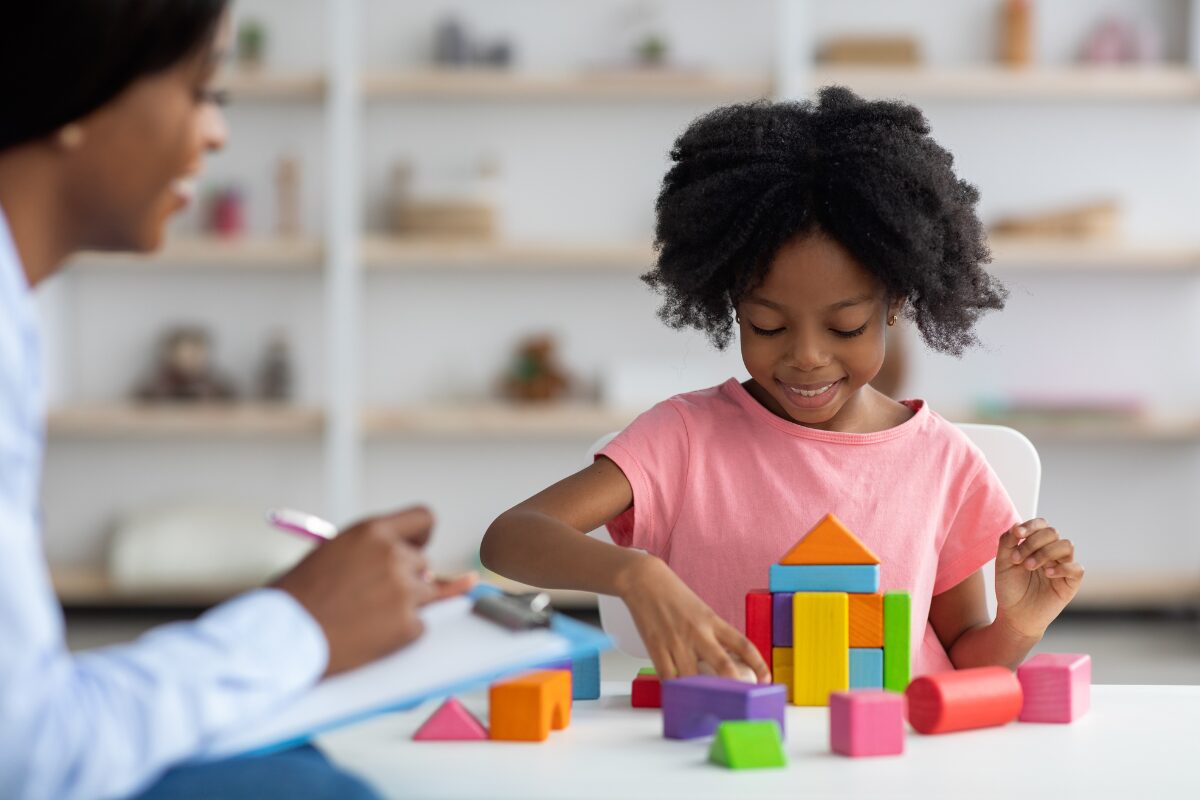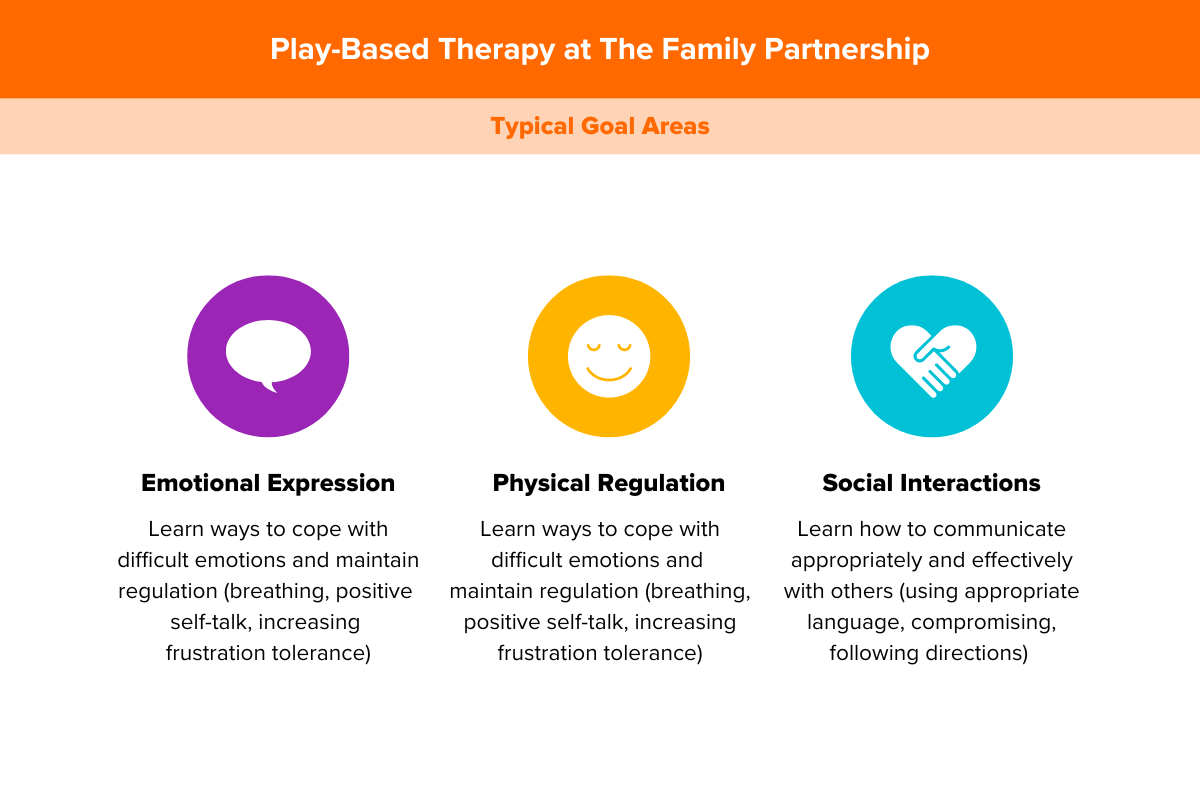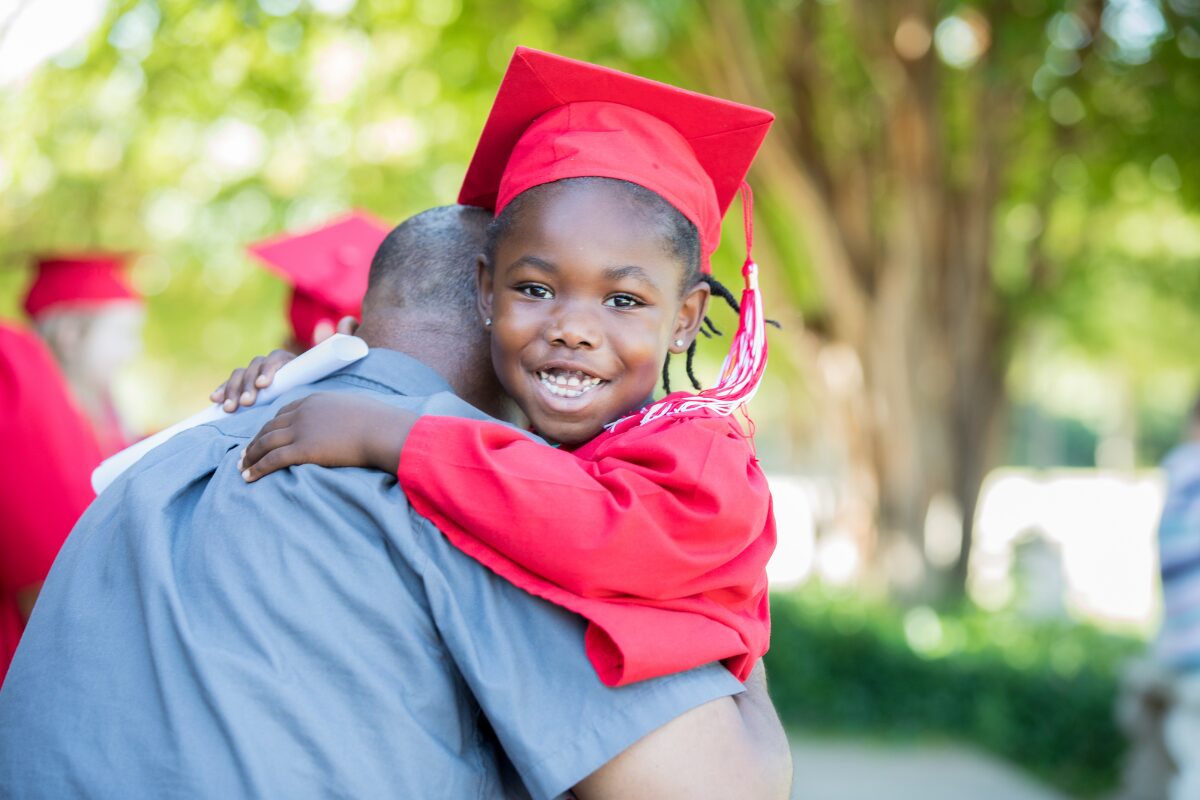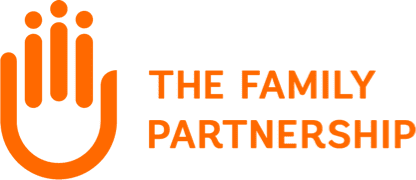Building Generational Success Through Play-Based Therapy at The Family Partnership

The Family Partnership offers play-based therapy for children, including outpatient services at our North Minneapolis and South Minneapolis locations. Play-based therapy is also available for children who attend our preschools, Four Directions and North Minneapolis Preschool, and several local PICA/Head Start locations.
What is play-based therapy?
According to Emily Geffre, Senior Director of Outpatient and Developmental Therapies, “play-based therapy provides an environment where children can explore their thoughts and emotions.” At The Family Partnership, “children get help from our therapists in special therapy rooms and in their classrooms. To a child, therapy feels just like play. But we know play is how young children explore their worlds and express themselves. This makes it a powerful tool for healing in children: it helps them to thrive and learn emotionally, physically, and socially.
There are three typical goal areas for children in play-based therapy:
- Emotional Expression: learn to be able to identify, experience and express a variety of emotions (sad, mad, happy, frustrated, disappointed, excited)
- Physical Regulation: learn ways to cope with difficult emotions and maintain regulation (breathing, positive self-talk, increasing frustration tolerance)
- Social Interactions: learn how to communicate appropriately and effectively with others (using appropriate language, compromising, following directions)
To a child, therapy feels just like play. But we know play is how young children explore their worlds and express themselves.
Emily Geffre, Sr. Director of Outpatient and Developmental Therapies

Why Play-Based Therapy Works for Young Children—and Why It’s Critical for Racial Equity
Children often lack the words to explain their feelings, especially if they’ve faced trauma or stress. This is particularly important for children of color, who experience higher rates of discipline in schools compared to their white peers—even when their behavior is similar. This discipline gap leads to missed opportunities, including learning essential skills for kindergarten, developing positive social relationships, and interacting with supportive adult role models.

Play-based therapy supports equity in early childhood, especially for young children who have experienced trauma, systemic racism, and/or racial bias.
When children of color are disproportionately disciplined, it can reinforce feelings of instability and exclusion. By contrast, play-based therapy offers an opportunity for children to express their feelings, heal from trauma, and improve behaviors—all while receiving positive support. In fact, young children in play-based therapy often show improved classroom behaviors, making them more likely to succeed both academically and socially.
Children’s behavior often has a meaning behind it, and by providing play therapy this allows the meaning behind their behavior to come out. Play-based therapy helps children process feelings of stress and instability, creating space for them to ask for help, express worries, or simply say they need a hug. With the right tools and support, children in play therapy can build the emotional resources they need to succeed.
Early Interventions Support Better Outcomes
Early childhood is a time of rapid brain development. From birth through age five, a child’s brain is building the foundation for emotional, social, and cognitive development that continues into adulthood. Early interventions, such as play therapy, provide crucial opportunities for young children who benefit from the extra support.
Play therapy equips children with tools to manage difficult emotions and behaviors, leading to better outcomes in the classroom and beyond. By intervening early, we can help children shift their thinking from “my world isn’t safe” to “it wasn’t stable before, but now it is,” as Geffre explains.
By intervening early, we can help children shift their thinking from “my world isn’t safe” to “it wasn’t stable before, but now it is.”
Emily Geffre, Sr. Director of Outpatient and Developmental Therapies
Children learn how to express their feelings, ask for help, and communicate their needs. This early intervention leads to better long-term emotional health, improved relationships, and greater resilience in handling future challenges. By supporting children early, we prevent long-term impacts from missed developmental opportunities and set children up for success in school and life.
Supporting Families for Success Across Generations
At The Family Partnership, play-based therapy is part of our 2gen approach to support whole-family success. By engaging with caregivers, our therapists learn the unique strengths and challenges of each family. With or without trauma, Geffre says, “it’s tough when a child is acting out and it’s especially hard when one child struggles while other siblings seem fine.” Play-based therapy helps caregivers understand that their child isn’t “bad.” Instead, they’re having a hard time and need support to figure out how to move past it.
“When you have a kid who keeps acting out, dysregulated, hitting other kids, it can wear on parents,” Geffre explains. Our therapists “help parents know that it’s not that they’re a bad person or that their kid is a bad kid…they haven’t yet figured out how to integrate their experiences, and we’re going to figure out ways to help them.”
“We help parents know that it’s not that they’re a bad person or that their kid is a bad kid…they haven’t yet figured out how to integrate their experiences, and we’re going to figure out ways to help them.
Emily Geffre, Sr. Director of Outpatient and Developmental Therapies

As part of The Family Partnership’s 2Gen approach, play-based therapy engages children and parents for lasting success.
Therapists at The Family Partnership work closely with caregivers to ensure they have the tools to support their children. Caregivers learn strategies to support long-term changes in their child’s behavior, ensuring that progress made in therapy is reinforced at home. Therapists also help families develop strategies they can use at home to reinforce what their child is learning in therapy.
Our therapists engage parents or caregivers by helping them understand their child’s behavior. When caregivers feel overwhelmed, therapists may offer referrals for family therapy, support groups, or services to meet basic needs. This holistic approach helps both children and parents feel more secure.
“We want parents to know, you are the expert on your child,” says Geffre. “Every child and every family is different, and we’re here to work with you to create a plan that helps your child succeed.”
Making Play Therapy Accessible and Inclusive
Preschool is a pivotal time for setting children on the path to success, especially for children of color who face opportunity gaps that begin before kindergarten. Play-based therapy is not only about addressing individual needs but also about ensuring that all children have equitable access to support that fosters their emotional and social development.
To reduce barriers to therapy, The Family Partnership brings services directly into our preschool classrooms. On-site therapy reduces the burden on families who may be struggling with financial or life stressors, and it ensures that children can access therapy faster. Our diverse team of therapists work closely with families to learn what is important to them, respecting family cultural values and incorporating them into the child’s treatment plan.
Our diverse team of therapists work closely with families to learn what is important to them, respecting family cultural values and incorporating them into the child’s treatment plan.
Geffre wants parents and caregivers to know that they can expect to find support and understanding with our therapists. “Some parents go into situations where they feel very judged, or they’re worried they are going to be judged,” explains Geffre. “The reality is, we do this work all the time. These kids are not surprising to us. In my experience, I’ve seen kids who are acting out the most are the most in need of help, and the change you see is that much greater.” By working in partnership with families, The Family Partnership helps children build the foundation for successful and healthy futures.
Interested in Play-Based Therapy at The Family Partnership?
Play-based therapy is a powerful tool for helping children heal from trauma, regulate emotions, and develop strong social skills. By offering therapy in a familiar environment like the classroom and involving families in the process, The Family Partnership meets children and parents where they’re at and supports them on their healing journeys.
Typically, we offer play-based therapy services from birth through elementary school—but older children have benefitted from play therapy as well. If your child needs support for emotional and behavioral challenges, play therapy might be the key to helping them thrive. To learn more about play therapy, contact:
Outpatient services:
English: 612-728-2061
HMOOB: 763-569-2625
info@thefamilypartnership.org
Preschools and PICA/Head Start:
Connect teachers or staff at your school.

